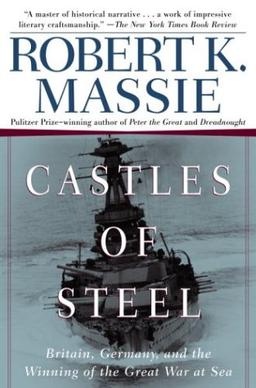Castles of Steel facts for kids
 |
|
| Author | Robert K. Massie |
|---|---|
| Country | England |
| Language | English |
| Genre | Non-fiction |
| Publisher | Ballantine Books |
|
Publication date
|
2003 |
| Media type | |
| Pages | 880 pp |
| ISBN | 978-0679456711 |
| OCLC | 57134223 |
| Preceded by | Dreadnought: Britain, Germany, and the Coming of the Great War |
Castles of Steel: Britain, Germany, and the Winning of the Great War at Sea is an exciting non-fiction book by Pulitzer Prize-winner Robert K. Massie. It tells the story of the most important naval battles during World War I. The book focuses on the navies of the United Kingdom and Imperial Germany. The title "Castles of Steel" was a phrase used by Winston Churchill. He was a British leader who saw many huge battleships of the Royal Navy in 1914. He thought they looked like powerful castles made of steel.
What's Inside: Epic Sea Battles
This book picks up where Massie's earlier book, Dreadnought, left off. It starts just before Germany and Britain declared war on each other. You'll learn about all the major naval strategies and battles of World War I.
Clashes at Sea: Famous Battles
The book covers several famous sea fights. One was the Battle of Coronel. Here, a German fleet led by Admiral Maximilian von Spee defeated a smaller British fleet. The British ships were commanded by Admiral Sir Christopher Cradock.
Soon after, the British got their revenge in the Battle of the Falkland Islands. A much stronger British fleet destroyed Admiral Spee's force. Another important battle was the Battle of Dogger Bank (1915).
The book also describes the Naval operations in the Dardanelles Campaign. This was a big effort to control a key waterway. A large part of the book is about the Battle of Jutland. This was the biggest naval battle of the entire war. It includes many chapters explaining what happened and its effects.
Submarines and Key Leaders
You'll also read about German submarine warfare. These submarines played a big role in the war. The book explains how these actions helped bring America into the conflict.
The book also introduces you to important naval leaders. These include British Admirals John Jellicoe and David Beatty. You'll also learn about German Admirals Franz von Hipper and Reinhard Scheer. The book ends with a dramatic event: the German High Seas Fleet sinking its own ships in Scapa Flow. This happened so the enemy couldn't capture them.
 | Kyle Baker |
 | Joseph Yoakum |
 | Laura Wheeler Waring |
 | Henry Ossawa Tanner |

